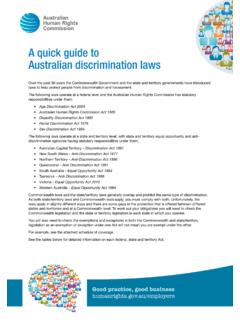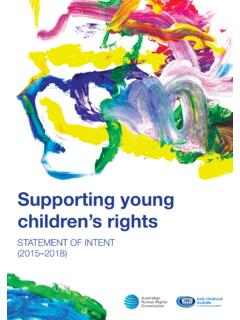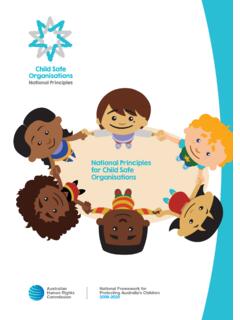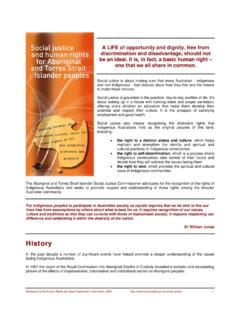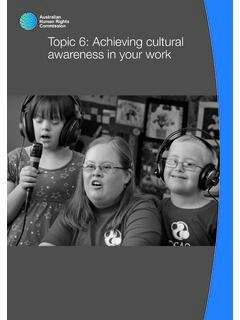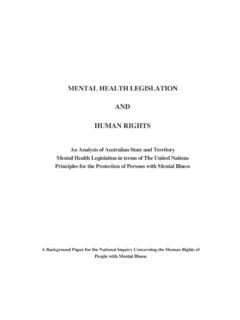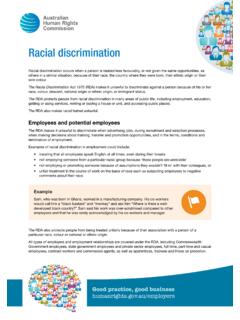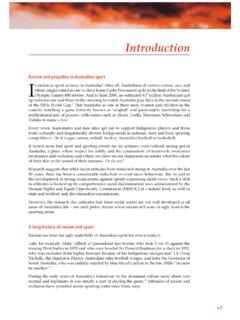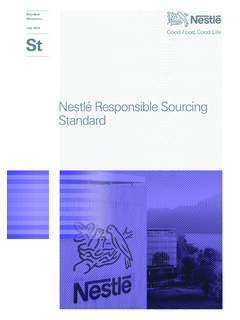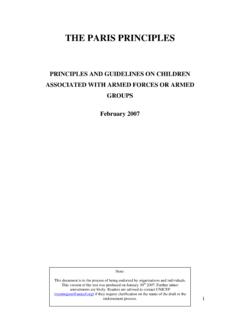Transcription of A step-by-step guide to preventing discrimination in ...
1 A step-by-step guide to preventing discrimination in recruitment *1. Deciding on the recruitment processEmployers go about recruiting in different ways. Some may use in-house human resources personnel; others may hire a recruitment agent to short-list the applicants and help select the successful recruitmentIf you are using your own staff to recruit to a position, you must make sure they are aware of their obligations under the law and are dedicated to a fair you do not take reasonable measures to prevent your staff from acting in a discriminatory way, you may be held responsible for their actions (see the fact sheet Vicarious liability at ). recruitment agentsAn employer that hires a recruitment agent to short-list applicants must make sure the agent is aware of their legal obligations when it comes to same applies if you are a recruitment agent.
2 While many employers are aware of their obligations, some may not be. As such, they may be at risk of unintentionally discriminating in the recruitment process. Because of this, recruitment agents have an important role in educating and reminding employers about their legal obligations. recruitment agents must not follow through with discriminatory requests from an employer that relate to a person s age, sex, race, disability or any other characteristic protected under state or federal anti- discrimination laws. If you are a recruitment agent and you receive a discriminatory request from a client, you must inform them that they are acting against the law. Let them know that they are putting themselves and you at risk of receiving complaints of discrimination .
3 Remind the employer that they are unnecessarily limiting their options in the job market by not seeking a wider range of the key requirements of the job with the employer, not irrelevant personal characteristics. Giving the employer information about what can and cannot be included in a job description is important. Providing the employer with a copy of this factsheet may also be useful. As a recruitment agent, you too can be held responsible for the actions of your staff and consultants. Make sure you provide them all with information and training on equal opportunity principles. You also need to provide training to your consultants about how to deal with discriminatory requests for certain types of applicants and the consequences of acting on discriminatory instructions from employers.
4 * Based on material provided by the Victorian Equal Opportunity and Human Rights Commission. See Guideline for the recruitment industry and employers available at practice, good practice, good Creating the job descriptionWhen you create a job description, you need to carefully consider the specific requirements of the job so that all potential applicants can clearly understand the skills and you are clear about the genuine requirements of the job, you can identify what specific information you need from the job applicants and why you need it. This is important because it helps you to avoid seeking unnecessary and potentially discriminatory information from applicants when you develop selection criteria or prepare interview questions.
5 You must avoid using discriminatory language in the job description and avoid references to personal characteristics such as age, race or sex unless they are part of the genuine requirements of the job (see below: Advertising the job). Write the job description using clear, easy-to-read language and make sure it: outlines the duties and skills required differentiates between essential and desirable including a diversity statement in the job description that encourages people from different backgrounds to apply, including Aboriginal and Torres Strait Islander peoples, people from culturally and linguistically diverse (CALD) backgrounds and people with Deciding on the application processSome application processes may disadvantage certain people.
6 Think about whether you need to adjust the process to accommodate the needs of applicants from different cultural backgrounds or people with disabilities. Some strategies you can use to remove barriers for applicants include: simplifying requirements to respond to any selection criteria ensuring any online job portals are accessible and easy to navigate simplifying application procedures not requesting unnecessary information. 4. Advertising the jobDiscriminatory advertising is against the law, with fines applying to organisations and discriminatory advertisement can also limit the range of applicants you attract. It is in your best interests to cast the net as widely as possible to attract a diverse range of good advertisement will focus exclusively on the skills and abilities needed to perform the job.
7 You may only mention personal characteristics such as age, sex or race if they are part of the genuine requirements of the job advertisement should be written in a way that does not discourage some people from applying or imply that only certain applicants will be considered. For example, using phrases like join a dynamic team or seeking mature, experienced professional suggests that you will only consider applicants of a certain age. Ensure your advertisement does not include words, phrases or euphemisms that could be seen as restrictive or discriminatory. Encourage as many suitable people as possible to apply. Depending on your organisation and the type of position, you may consider advertising internally and externally.
8 Try using specialist media outlets and networks, as well as mainstream media, local newspapers, informal networks, community groups, industry groups and other of discriminatory application processesAsking applicants to submit a comprehensive written statement on why they want the job might not be necessary for a cleaning position. It could also discourage people with limited English language skills from applying for the only an online portal for applications could deter applicants with certain forms of disabilities from applying, as they may have difficulty accessing the system or navigating through the application process. Consider offering an alternative application process for these step-by-step guide to preventing discrimination in recruitment 3As with the job description, consider including a diversity statement in the advertisement that encourages people from different backgrounds to apply, including Aboriginal and Torres Strait Islander peoples, people from CALD backgrounds and people with Short-listing applicantsEmployers and recruitment professionals must have a clear understanding of the job requirements.
9 Request and review information from all applicants about their capacity to perform the job based on their skills and applicants according to the requirements of the job. Do not allow personal bias, myths or stereotypes to influence your decision. When short-listing applicants, make sure you: evaluate applicants using the selection criteria; matching skills, ability and experience with the job requirements are consistent with your decision-making clearly document your reasons for making decisions to help you to provide feedback to applicants Interviewing applicantsThe interview is an important opportunity for applicants to talk about their suitability for the position and what they have to offer. Employers and recruitment professionals should carefully review and plan their interview process.
10 Make sure all applicants have an equal opportunity to participate in their interview and explain why they are the best person for the for the interviewThe interview should be conducted at a venue that is accessible to people with disabilities. Ask the interview candidate if they need any special assistance to participate in the interview. For example, a person who has a hearing impairment may need an Auslan interpreter or some other kind of adjustment to the interview process. You can ask these questions when you inform the candidate about what will happen at the interview. This will mean the candidate and the interviewer or the panel are fully should also develop a set of common interview questions that all candidates will be asked.


